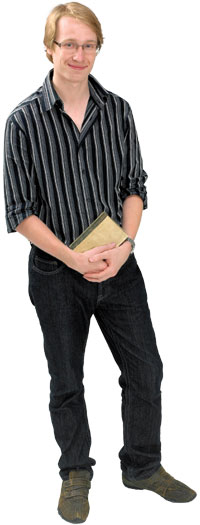
The 1515 edition of Roman poet and philosopher Lucretius’s On the Nature of Things published by the great Venetian printer Aldus Manutius. This copy once belonged to Cardinal Domenico, one of the most prolific biblioklepts of all time.
I got about twelve or fifteen books today, ordered though the Internet. One is a presentation copy of a book on Catullus inscribed by the author to an Oxford undergraduate who went on to be a quite important scholar. I almost missed it. The bookseller had misspelled the name.
I keep a list of fifty books that I want in the order that I want them. An example: The 1739 edition of Manilius’s Astronomicon prepared by Richard Bentley. It’s one of the landmark books, probably the most important text in Latin criticism for two hundred years, from the mid-1600s to the mid-1800s.
In terms of purchasing, either AbeBooks or Biblio.com, but every morning I get an e-mail from eBay about all the new items matching my favorite searches. The sellers are often unaware of what they have, so it’s quite exciting.
The main kind of music I’m interested in is a small genre called post-hardcore, bands like Christie Front Drive.
If you include the charity shops, we probably have five used bookstores here. One of the best is David’s, which is spoken about by all the great book collectors who came through Cambridge, including John Carter, who got his start at the book-market stall of G. David. I visited all the shops today and found only one book, but then I go round every other day.
Mostly obscure Latin texts and commentaries from the late Roman period. I also read grammars and dictionaries. Even though classics is in the arts, I approach it as a science. I’m also always reading bookseller catalogs. I got three this week, but the prices of books keep on soaring while the books stay pretty much the same.
Obviously Virgil and his sixth eclogue and Horace’s odes. Then I came across Lucretius, who wrote a six-book poem that attempted to convert people to his philosophy. He was trying to explain atomic physics to the Roman elite. It’s one of the most interesting poems ever written.
I work in quite a niche field in classics. I’m specifically interested in Latin and Greek texts. It’s not very sexy—not the sort of thing you see on television. I really want to enter the academic community at Cambridge, unless I chuck it all to become a bookseller.
The Penguin Dictionary of Latin. Robert Shorrock asked me if I wanted to coedit it with him. I’m reviewing the proofs right now. After three years of work, I’m glad it’s finally done.


